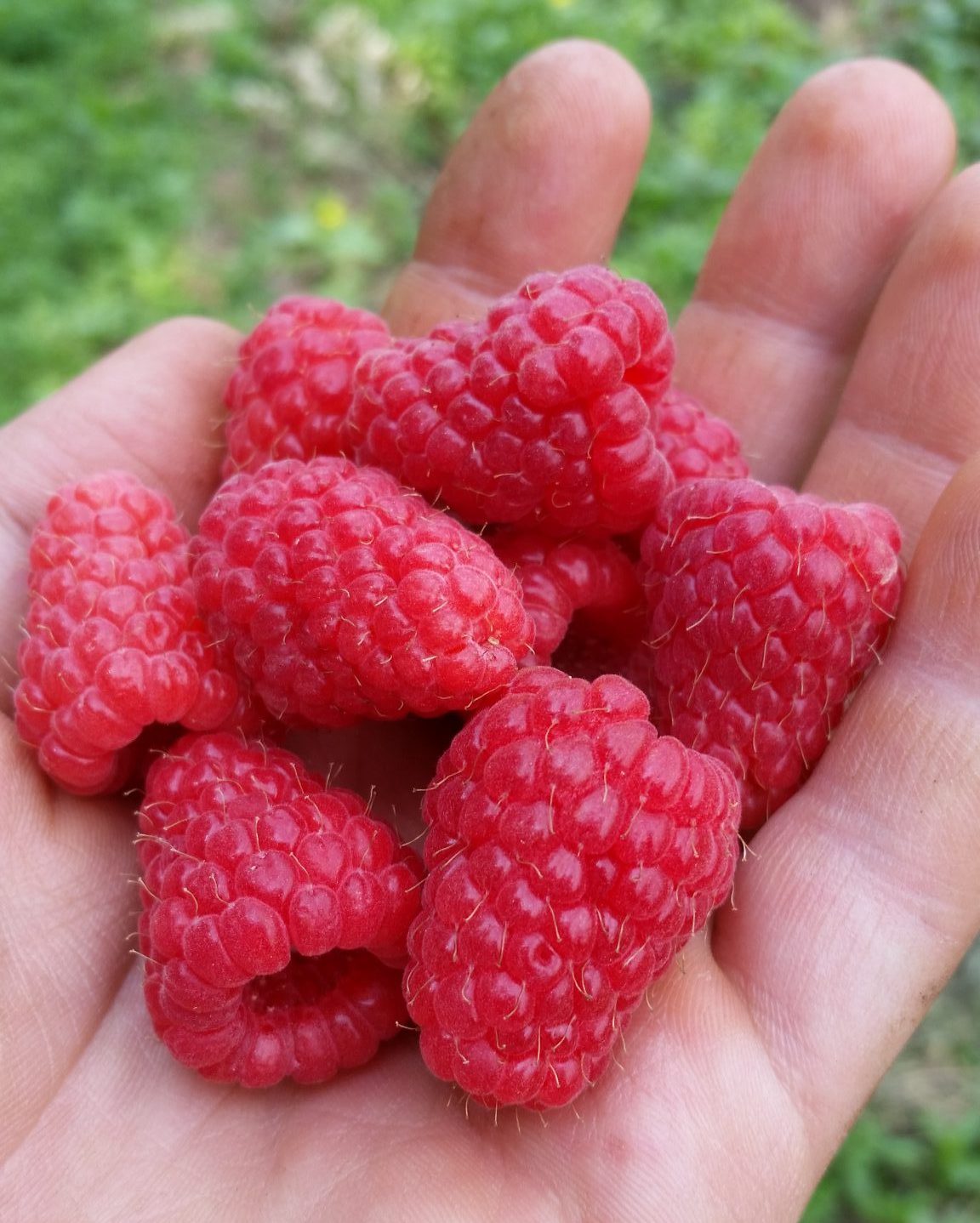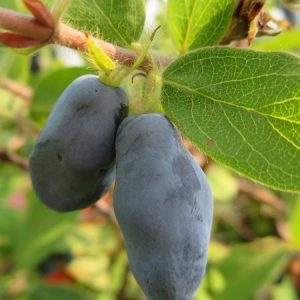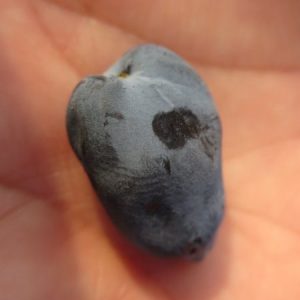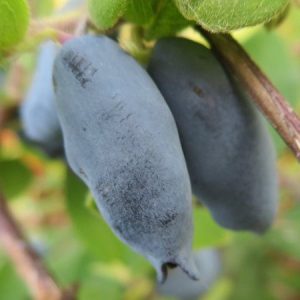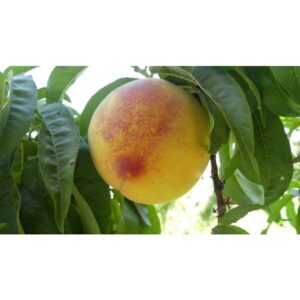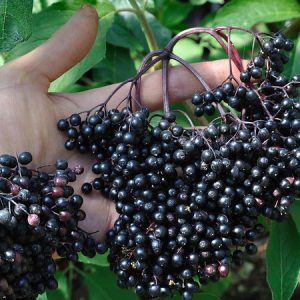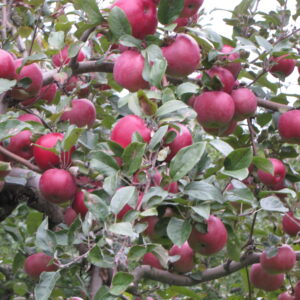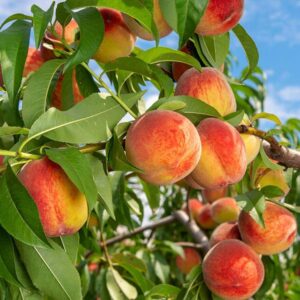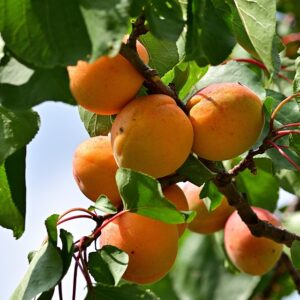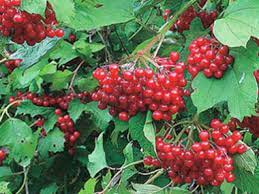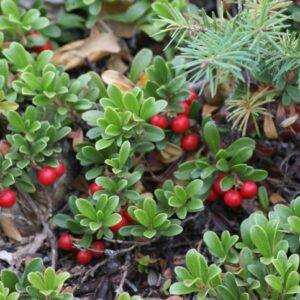Shipping of spring plants is now closed for the 2024 season! New orders will not be accepted.
All other items including merchandise and pantry items are still available for order online.
Showing all 15 results
‘Boreal Beast’ Haskap
$18.00Boreal Beast is very vigorous and sturdy upright growing haskap. What makes Beast stand out is its later flowering and late-season fruit ripening. Its fruit are remarkable for flavour when fresh or frozen. Cross-pollination is required. Compatible with Boreal Beauty, Boreal Blizzard and Honeybee. New release 2018!
Also known as Honeyberries or Blue Honeysuckle, Canadian Haskap are superior to any other Honeyberries with sweeter, wild Blueberry flavour and larger, fleshier fruit not unlike oversize Blueberries. The plant themselves are extremely cold tolerant and these are a great fruit alternative for cold climates.
BOREAL TRIO: SAVE 10% when you purchase one of each of the 2″ Potted Boreal series haskaps (Beast, Beauty & Blizzard)
Pre-order now to pick up from the farm or ship via mail order this spring!
Select from available product options. ONLY 2” Potted plants qualify for Mail Order Shipping.
‘Boreal Beauty’ Haskap
$18.00Boreal Beauty fruits are heavy, firm, mostly oval, and hold onto branches with just the right amount of force and taste great. Bushes are strong, upright growers and show no signs of mildew. Very productive! Almost all large-fruited haskap cause branches to bend over, but not ‘Boreal Beauty’, her branches remain strong and upright. Another member of the Boreal series that flowers and ripens later than previous UofS cultivars. Cross-pollination is required. Currently only compatible with Boreal Beast. New release in 2017!
Also known as Honeyberries or Blue Honeysuckle, Canadian Haskap are superior to any other Honeyberries with sweeter, wild Blueberry flavour and larger, fleshier fruit not unlike oversize Blueberries. The plant themselves are extremely cold tolerant and these are a great fruit alternative for cold climates.
BOREAL TRIO: SAVE 10% when you purchase one of each of the 2″ Potted Boreal series haskaps (Beast, Beauty & Blizzard)
Pre-order now to pick up from the farm or ship via mail order this spring!
Select from available product options. ONLY 2” Potted plants qualify for Mail Order Shipping.
‘Boreal Blizzard’ Haskap
$18.00Boreal Blizzard is one of the first larger berried varieties set to completely change the Haskap industry! It was so named because the fruit size, productivity, and flavour stopped the breeders in their tracks. Berries are more than twice as heavy as ‘Tundra’ or ‘Borealis’. This variety is an excellent choice for home growers, U-picks and commercial harvester type orchards. The first release of the Boreal series that flowers and ripens later than previous UofS cultivars. Cross-pollination is required. Compatible with Borealis, Boreal Beast, Honey Bee & Tundra as pollinizers. New release in 2016.
Also known as Honeyberries or Blue Honeysuckle, Canadian Haskap are superior to any other Honeyberries with sweeter, wild Blueberry flavour and larger, fleshier fruit not unlike oversize Blueberries. The plant themselves are extremely cold tolerant and these are a great fruit alternative for cold climates.
BOREAL TRIO: SAVE 10% when you purchase one of each of the 2″ Potted Boreal series haskaps (Beast, Beauty & Blizzard)
Pre-order now to pick up from the farm or ship via mail order this spring!
Select from available product options. ONLY 2” Potted plants qualify for Mail Order Shipping.
‘Kolomikta’ Hardy Kiwi [Male]
Kolomikta Hardy Kiwis are gorgeous vines of heart-shaped pink, white, and green leaves with small, white fragrant flowers that will eventually bloom into green-ish/orange coloured fruits in early Fall! They can be grown much like grapes on a trellis system or climb a pergola. Can take up to 3 years for the tri-colour foliage to appear.
**NOTE** Both a male and female plants are required for fruit production. The male variety does not bear fruit itself but is necessary for fruit production.
SAVE 17% when you purchase two females and one male Kolomikta Hardy Kiwis.
Pre-order now to pick up from the farm this spring!
Select from available product options.
‘Korsor’ Elderberry
$20.00Korsor is a variety of black European elder notable for its large, dark, juicy berries. It grows to about 8 feet tall. Bred in Demark.
European black elderberries are the most sought-after and productive elder species because they have been selected for heavy yields and cold hardiness. The berries are renowned as a nutritive anti-viral and immune system tonic. If you buy elderberries or elderberry tincture in the store, you are most likely looking at a variety of European black elder, Sambucus nigra. Flowers can also be harvested!
This species is partly self-fertile, so doesn’t require cross-pollination, but the yields will be heavier with a second variety planted nearby. Elder shrubs prefer partial shade to full sun, with higher yields in more sun. It’s best to irrigate them in summer. Netting may be required to keep birds from destroying berry crop.
American elderberries (Sambucus canadensis) are native to the Midwest US and are more vigorous than black European elderberries (Sambucus nigra). Both are planted commercially for medicinal berries. Our Kootenay native blue elderberry (S. cerulea) also make wonderful medicine, and they are more drought tolerant than other varieties. Don’t accidentally mistake red elderberries (S. racemosa) for any of the edible and medicinal varieties – they are not safe to consume.
Pre-order now to pick up from the farm this spring!
Select from available product options.
‘Red Spy’ Apple
$75.00The Red Spy Apple Tree is an old variety, originating in NY in the 1800’s. It is similar to Northern Spy but with a much redder skin and bright stripes. The fruit is very tender and juicy and great for cooking as well as storing. Creamy-colored flesh with a sweet-tart flavour that is crisp, aromatic, and juicy. Grafted onto semi-dwarf rootstock.
Pre-order now to pick up from the farm this spring! Fruit trees DO NOT qualify for shipping.
Select from available product sizes and rootstocks.
See “Rootstock Details” tab below for more information on roostock characteristics.
Black Currant
$16.00A handsome fruiting hedge. Extremely productive. Medium-sized fruit forms in clusters on this compact, upright bush. Fruit is high in vitamin C and can be eaten fresh, but is traditionally used for prized and popular preserves. Also ideal for juicing, wine, and fruit liqueurs. Plant tolerates shade. Cold-hardy. Ripens in June or July. Self-pollinating.
*Do not plant within 900 ft. of white pines due to the potential for Blister Rust.
Pre-order now to pick up from the farm this spring!
Select from available product options.
Available as : #01 potted
Black Jostaberry
$20.00A gooseberry and currant cross! The rich berry taste is reminiscent of gooseberry with a kiss of black currant. Deep-red, almost-black fruit is high in vitamin C and forms in large clusters, ideal for juices, jams and jellies, and fresh-eating. Cold-hardy plants are long-lived, thornless, and productive once established. Debuted in 1977. The name “jostaberry” itself is a combination of the German word for blackcurrant, “Johannisbeere” and for gooseberry, “Stachelbeere”. Disease-resistant to American gooseberry mildew, black currant leaf spot, white pine blister rust, and big bud gall mite. Ripens in July. Self-pollinating but does well with cross-pollination.
Pre-order now to pick up from the farm this spring!
Select from available product options.
Available as: #02 Potted
High Bush Cranberry
$16.00Beautiful white blossoms found in the late spring lead to large clusters of bright red berries by the end of the summer. Tolerant of frost, likes sun and can do well in most soil types though it prefers well-drained, moist soils. The fruits may be eaten raw or cooked. Like “regular” cranberries, they are high in vitamin C and have a deliciously tart, acid taste!
Pre-order now to pick up from the farm this spring!
Select from available product options.
#1 potted
Kinnikinnick Bearberry
$16.00Hardy native mat-forming evergreen groundcover with small shiny foliage and pink, bell-shaped blooms in spring followed by red berries. Prefers a moist, well-drained soil. Drought tolerant once established. Kinnikinnick berries are edible but mealy and tasteless, but were an important traditional food source for some First Nations groups because of their persistence on branches throughout the winter. Due to their texture and lack of taste, the berries were usually processed, cooked, or preserved in some way. Young leaves can be used in tea as well.
Pre-order now to pick up from the farm this spring!
Select from available product options.
Available as: #01 Potted
Red Currant
$16.00Grow clusters of popular dark red berries! Attractive heavy-bearing bushes yield the tastiest currants you’ve ever savored. Berries hold well on the bush and are ideal for jellies, preserves, tarts, and muffins. Cold-hardy. Ripens in July. Self-pollinating.
*Do not plant within 900 ft. of white pines due to the potential for Blister Rust.
Pre-order now to pick up from the farm this spring!
Select from available product options.
Available as : #01 potted
White Currant
$16.00A natural mutation of the red currant varieties. Medium-sized fruit forms in clusters on this compact, upright bush. The small, round berries appear green to start but later transform into creamy shades of white and pink. Fruit is high in vitamin C and can be eaten fresh, but is traditionally used for prized and popular preserves. Plant tolerates shade. Cold-hardy. Ripens in June or July. Self-pollinating.
*Do not plant within 900 ft. of white pines due to the potential for Blister Rust.
Pre-order now to pick up from the farm this spring!
Select from available product options.
Available as: #01 potted



